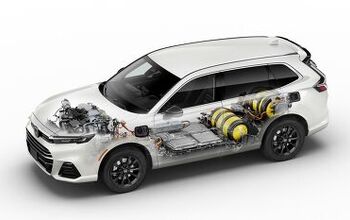Volkswagen, Feds Reach Fix and Buyback Deal on Remaining Diesels: Report

Volkswagen’s disastrous diesel debacle could nearly be over in the U.S.
Bloomberg has reported that sources close to the issue claim VW and U.S. regulators have agreed on a plan for the roughly 80,000 Volkswagen, Audi and Porsche vehicles equipped with emissions-cheating 3.0-liter engines. Those sources have also revealed how many vehicles will be bought back and scrapped, and how many will live to see another day.
Both the Environmental Protection Agency and California Air Resources Board (CARB) have agreed to let VW fix 60,000 vehicles with a simple software update, the sources claim. About 19,000 older vehicles would be too complex to fix, so the automaker will instead offer to purchase them from the owner.
The number of vehicles deemed unfixable could change before an official deal is announced.
The court-appointed lead counsel for the steering committee behind a consumer lawsuit against VW claims a deal hasn’t been reached. In an email, Elizabeth Cabraser said no agreement exists between owners and lessees of certain 3.0-liter VW Group vehicles.
“Any resolution must grant these consumers similar benefits — including a choice between a buyback or a fix if approved by regulators — as were offered to class members in the 2.0-liter vehicle litigation,” wrote Cabraser. “While an agreement between the EPA and Volkswagen may address some of the environmental damage, it does not hold the company accountable for the harm caused to consumers. We will continue to pursue a fair resolution on their behalf.”
Avoiding a full buyback would reportedly save the company $4 billion. As of now, there’s no price tag attached to the rumored plan. The models affected by the scandal are the VW Touareg, Porsche Cayenne, Audi Q5, Q7 and A8.
The U.S. District Court judge presiding over the issue got tired of waiting for a fix this past August, ultimately forcing VW to enter settlement talks. Already, VW’s diesel transgressions have cost the automaker $16.5 billion in the U.S. alone. The automaker choose to drag its feet to avoid repeating the costly full-scale buyback (with the option of a yet-nonexistent fix) seen with its 2.0-liter vehicle.
Satisfying regulators isn’t VW’s only task. It also faces a class-action lawsuit from customers (all of whom want their 3.0-liter vehicle bought back), and a Federal Trade Commission lawsuit over false advertising.
Note: This story has been updated to include comment from Elizabeth Cabraser, Court-appointed Lead Counsel for the Plaintiffs’ Steering Committee in the Volkswagen “Clean Diesel” Marketing, Sales Practices, and Products Liability Litigation.

More by Steph Willems
Latest Car Reviews
Read moreLatest Product Reviews
Read moreRecent Comments
- Varezhka Dunno, I have a feeling the automakers will just have the cars do that without asking and collect that money for themselves. Just include a small print in your purchasing contract.I mean, if Elon Musk thinks he can just use all the Teslas out there for his grid computing projects for free, I wouldn't be too surprised if he's already doing this.
- Varezhka Any plans yet for Stellantis to wind down some of their dozen plus brands? I mean, most of their European brands (except Fiat and Maserati) are not only 80~90% European sales but also becoming old GM level badge jobs of each other. Lots of almost identical cars fighting within the same small continent. Shouldn't they at least go the Opel/Vauxhall route of one country, one brand to avoid cannibalization? The American brands, at least, have already consolidated with Dodge/Chrysler/Jeep/RAM essentially operating like a single brand. An Auto Union of a sort.
- Namesakeone I read somewhere that Mazda, before the Volkswagen diesel scandal and despite presumably tearing apart and examining several Golfs and Jettas, couldn't figure out how VW did it and decided then not to offer a diesel. Later, when Dieselgate surfaced, it was hinted that Mazda did discover what Volkswagen was doing and kept quiet about it. Maybe Mazda realizes that they don't have the resources of Toyota and cannot do it as well, so they will concentrate on what they do well. Maybe Mazda will decide that they can do well with the RWD midsized sedan with the inline six they were considering a few years ago
- IH_Fever A little math: An average, not super high end EV (like a model 3) has 70 kwh of storage assuming perfect fully charged conditions. An average 2-3 person home uses roughly 30 kwh per day. So in theory you have a little over 2 days of juice. Real world, less than that. This could be great if your normal outage is short and you're already spending $50k on a car. I'll stick with my $500 generator and $200 in gas that just got me through a week of no power. A/c, fridge, tv, lights, we were living large. :)
- EBFlex No. The major apprehension to buying EVs is already well known. The entire premise of the bird cage liner NYT is ridiculous.The better solution to power your house when the power goes out is a generator. Far more reliable as it uses the endless supply of cheap and clean-burning natural gas.


































Comments
Join the conversation
Gotta wonder what the deal is there. If VW could release an innocuous "software update" that fixed the issue they would have - so either the fix isn't really a fix, or (more likely) there's going to be some annoyed owners with engines that produce less power, or have worse fuel economy as a result of this "fix", IMHO.
I didn't realize all 3.0 TDI customers wanted a buyback - that's significant.